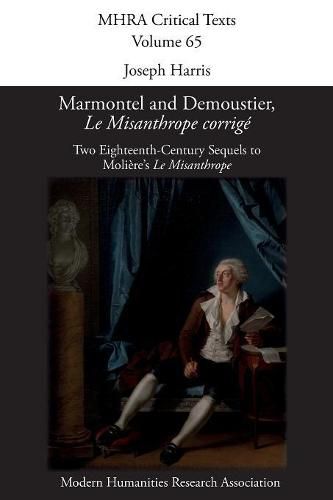Readings Newsletter
Become a Readings Member to make your shopping experience even easier.
Sign in or sign up for free!
You’re not far away from qualifying for FREE standard shipping within Australia
You’ve qualified for FREE standard shipping within Australia
The cart is loading…






This title is printed to order. This book may have been self-published. If so, we cannot guarantee the quality of the content. In the main most books will have gone through the editing process however some may not. We therefore suggest that you be aware of this before ordering this book. If in doubt check either the author or publisher’s details as we are unable to accept any returns unless they are faulty. Please contact us if you have any questions.
At the end of Moliere’s masterpiece Le Misanthrope (1666), the irascible anti-hero Alceste storms off the stage, resolved to spend the rest of his life in a remote wilderness rather than to spend another moment mixing with corrupt Parisian society. Moliere’s comedy is thus, in an important sense, unfinished, and various writers over the centuries, from Fabre d'Eglantine in the eighteenth century to David Ives in the twenty-first, have written sequels - works that aim simultaneously to exploit the popularity of the original play, to resolve its narrative, and to lay to rest some of its more troubling implications about society. This volume brings together two of the first sequels. As their titles imply, both Jean-Francois Marmontel’s ‘moral tale’ Le Misanthrope corrige (1765) and its dramatic adaptation, Charles-Albert Demoustier’s three-act verse comedy Alceste a la campagne, ou le Misanthrope corrige (c.1790), follow the gradual rehabilitation of Moliere’s bad-tempered misanthrope. This critical edition traces the two plays’ complex relationships both to each other and to Moliere’s original comedy. It situates them both in the context of Moliere reception in the Enlightenment, and particularly in relation to Marmontel’s debates with Jean-Jacques Rousseau about the ethics and aesthetics of Moliere’s original play.
$9.00 standard shipping within Australia
FREE standard shipping within Australia for orders over $100.00
Express & International shipping calculated at checkout
This title is printed to order. This book may have been self-published. If so, we cannot guarantee the quality of the content. In the main most books will have gone through the editing process however some may not. We therefore suggest that you be aware of this before ordering this book. If in doubt check either the author or publisher’s details as we are unable to accept any returns unless they are faulty. Please contact us if you have any questions.
At the end of Moliere’s masterpiece Le Misanthrope (1666), the irascible anti-hero Alceste storms off the stage, resolved to spend the rest of his life in a remote wilderness rather than to spend another moment mixing with corrupt Parisian society. Moliere’s comedy is thus, in an important sense, unfinished, and various writers over the centuries, from Fabre d'Eglantine in the eighteenth century to David Ives in the twenty-first, have written sequels - works that aim simultaneously to exploit the popularity of the original play, to resolve its narrative, and to lay to rest some of its more troubling implications about society. This volume brings together two of the first sequels. As their titles imply, both Jean-Francois Marmontel’s ‘moral tale’ Le Misanthrope corrige (1765) and its dramatic adaptation, Charles-Albert Demoustier’s three-act verse comedy Alceste a la campagne, ou le Misanthrope corrige (c.1790), follow the gradual rehabilitation of Moliere’s bad-tempered misanthrope. This critical edition traces the two plays’ complex relationships both to each other and to Moliere’s original comedy. It situates them both in the context of Moliere reception in the Enlightenment, and particularly in relation to Marmontel’s debates with Jean-Jacques Rousseau about the ethics and aesthetics of Moliere’s original play.